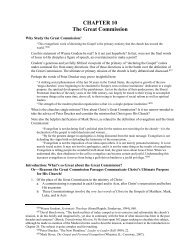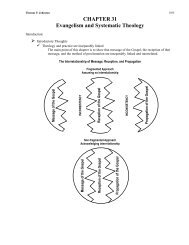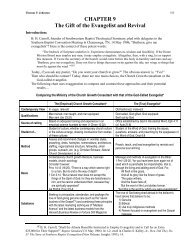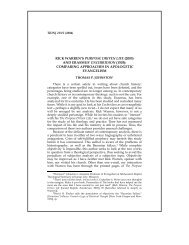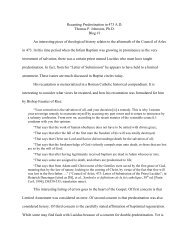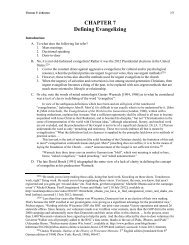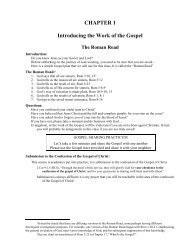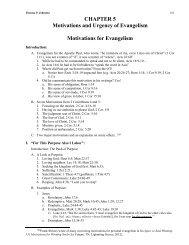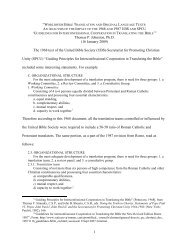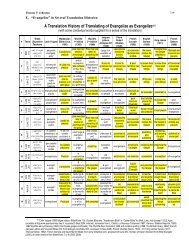Four Categories of Evangelism Programs - Evangelism Unlimited
Four Categories of Evangelism Programs - Evangelism Unlimited
Four Categories of Evangelism Programs - Evangelism Unlimited
Create successful ePaper yourself
Turn your PDF publications into a flip-book with our unique Google optimized e-Paper software.
Thomas P. Johnston 1017<br />
children, if she has lodged strangers, if she has washed the saints' feet, if she has relieved the<br />
afflicted, if she has diligently followed every good work”<br />
d. Further miss the point, that even for needy widows within the fellowship <strong>of</strong> the church,<br />
other avenues were to be sought out for those who did not meet the stringent<br />
qualifications (e.g. that their children take care <strong>of</strong> them or that they get married)?<br />
e. How then could church funds be used to evangelize unsaved people, in a “Christian<br />
Social Welfare” sense, without contradicting Paul’s teaching in 1 Timothy 5?<br />
Consider also “Reverse-Servant-<strong>Evangelism</strong>” in the New Testament:<br />
1. Why did not Jesus buy a bucket and bring water to the Woman at the Well? Rather he asked<br />
her for water, John 4:<br />
a. Was Jesus being chauvinistic? Was He too good to get His own water? I think not!<br />
b. Could not Jesus had made water gush out <strong>of</strong> a nearby rock, like Moses did when he<br />
struck the rock (Exod 17:6; Num 20:11)? That would really have gotten this unsavory<br />
woman’s attention!<br />
c. Or how about creating a pulley system to help her get the water? Surely that was in His<br />
ability to do:<br />
1) Yet, Jesus did say in John that He did only the works that His Father wanted Him to<br />
do: “for the works which the Father has given Me to accomplish, the very works that<br />
I do” (John 5:36; cf. John 5:17; 8:28; 10:32, 37-38; 17:4)<br />
2) Therefore, Jesus was limited in what He could do by the will <strong>of</strong> His Father<br />
3) Also, Jesus could do no miracle because <strong>of</strong> their unbelief, Mark 6:5<br />
4) Notice how the miraculous did not lead the Jews in John 6 to faith in Christ,<br />
John 6:26-31<br />
5) John clearly wrote:<br />
John 12:37-38, “But although He had done so many signs before them, they did not believe<br />
in Him, 38 that the word <strong>of</strong> Isaiah the prophet might be fulfilled, which he spoke: ‘Lord,<br />
who has believed our report? And to whom has the arm <strong>of</strong> the LORD been revealed?’”<br />
6) Likewise, an adulterous generation graved for a sign, but none would be given to it,<br />
Matt 12:39; 16:4<br />
d. Without wanting to be sarcastic or sacriligeous, Jesus specifically asked her [the Woman<br />
at the Well] to serve Him to begin the conversation with her<br />
e. And to think that the account <strong>of</strong> the Woman at the Well in John 4 is the primary account<br />
used for relational evangelism…<br />
2. Likewise, when Jesus sent out His apostles on evangelistic mission trips, He specifically<br />
commanded them not to bring money, a change <strong>of</strong> clothing, or even a staff for the<br />
evangelistic mission trip, “for the workman is worthy <strong>of</strong> his wages,” Matt 10:9-10;<br />
cf. Mark 6:8; Luke 9:3; 10:4:<br />
a. The apostles did not have the funds to buy anything (batteries, light bulbs, cookies,<br />
water, kool aid, hot chocolate, Christmas wripping, etc.), nor even to make anything<br />
(quilts, etc.), for those with whom they shared the Gospel<br />
1) Perhaps there were no poor or needy people in the time <strong>of</strong> Jesus? Yes, Jesus said to<br />
Judas Iscariot, who seemed to be interested in serving the poor, “The poor you will<br />
have with you always,” John 12:8<br />
2) Why did Jesus not train the apostles in felt-need evangelism in Matthew 10? Perhaps<br />
at issue is not meeting physical felt needs, but finding those whom God has given an<br />
ear to hear<br />
b. The apostles were left completely at the mercy <strong>of</strong> those to whom they first ministered<br />
the Gospel, remembering that they were going “to every city and place where He<br />
Himself [Jesus] was going to come,” Luke 10:1<br />
1) Jesus sent them on Reverse-Servant-<strong>Evangelism</strong>: they needed to be served by those<br />
to whom they shared the Gospel



